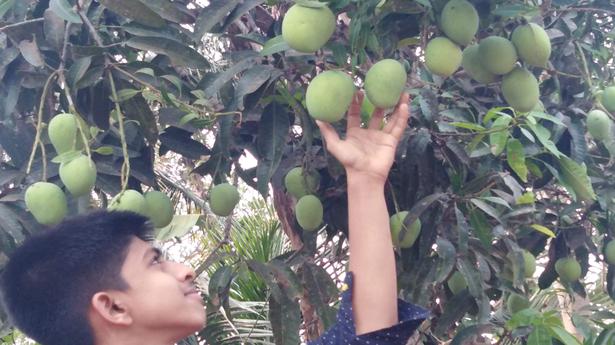
The sweet taste of brand Kuttiattoor
The Hindu
The first native mango from Kerala to get a GI tag is inspiring farmers and researchers to save more indigenous varieties of the fruit
To save a mango, you can make squash, jam and juice. Prabhakaran VO, a retired agricultural officer and Kuttiattoor mango enthusiast, says they have launched two new products with the fruit: raw mango powder and sun-dried mango juice (locally known as thera).
In September 2021, the Kuttiattoor mango which grows in abundance mainly in Kuttiattoor, a small village in Kannur district, became the first mango from Kerala to get a GI tag. This mango, also known as ‘Nambiar maanga’, ‘Kannapuram maanga’, ‘Kunjimangalam manga’ and ‘Vadakkumbhagam manga,’ is one of the State’s many delicious indigenous varieties.
To protect the mango cultivar and help farmers, the Kuttiattoor Mango Producer Company was formed on August 18, 2016, with Prabhakaran as chairman, and with the panchayat president, residents and agricultural officers as board members. With the support of the Agriculture Department, the company is providing saplings and grafts of the plant to propagate it.
“Kerala used to have nearly 100 varieties of native mangoes. Rapid urbanisation has seen many of those disappear. Efforts are now being made to popularise and propagate these regional avatars of the fruit by voluntary bodies, agriculture scientists and mango enthusiasts,” says CR Elsy, former head of the Intellectual Property Right Cell of Kerala Agricultural University.
Oral history has it that some three hundred years ago, mango saplings were brought to two aristocratic households in Kuttiattoor. The trees flourished in the rich soil of the area. Birds and animals spread the seed and trees grew abundantly in several houses.
Prabhakaran, who worked in the area as agriculture officer, says that the local mango was taken for granted as it was common in the village. The fruit, a deep fiery orange when it ripens, was mainly sold in the Irikkur market, about 11 kilometres from the village. Adds Prabhakaran: “Farmers noticed that there was a great demand for the large fibrous fruit. The skin of the ripe mango has no black spots; it is a uniform golden yellow colour. Instead of the several names it was known by, we decided to call it after our village, Kuttiattoor.”
In 2016, efforts were taken to procure a GI status for this mango. Elsy joined hands with farmers in Kuttiattoor on this mission. The speciality of the mango is that its saplings and grafts grow into trees that yield fruits with the same texture and taste of the parent plant, which is not the case with all mangoes.

We know birds, animals and insects constantly communicate with each other by making certain sounds. But when we think about plants, we do not ever think of them communicating. Charles Darwin, an eminent biologist, thought otherwise. Plants might appear the quiet, silent and solitary type of organisms but they have a complex way of communicating which is interesting and important for their survival.

Podcasts have become our best friends, especially during the Covid-19 pandemic. Whether you are cooking, sketching or going on an evening walk, there is a show that matches your mood. From horror tales to informative conversations to just two friends talking about anything & everything relatable, podcasts have become a part of our lives unknowingly. Over the years, more voices have joined this audio landscape and filled it with stories that resonate with our lives. Podcasts serve as a reminder that everyone has a story worth telling and listening to!









